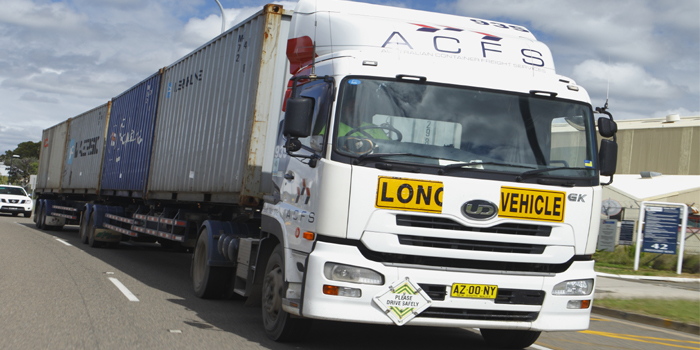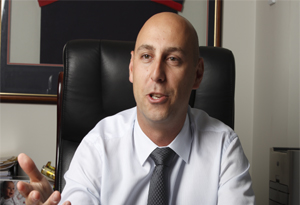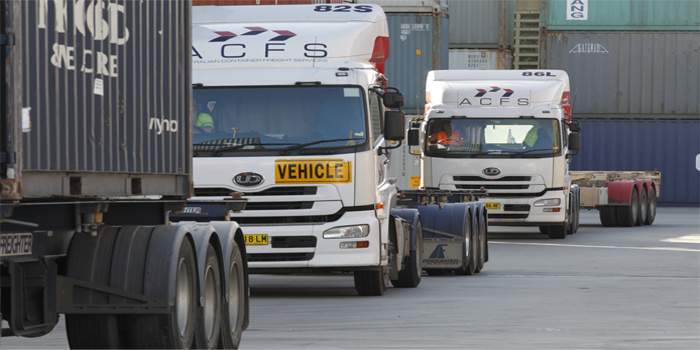There are no busier roads in Australia for heavy-duty transport than right within the country’s main seaports, with millions of shipping containers arriving and departing—and needing to be transported—each year.
In this non-stop environment where logistics are under incredibly tight deadlines, reliability is everything. This is what makes UD Trucks the king of the wharves.
“Our general fleet normally works 24 hours a day, and a minimum five days a week. If the wheels aren’t turning, they’re not making money,” says Arthur Tzaneros, Managing Director, Australian Container Freight Services (ACFS), the largest privately owned container-port transport operator in Australia. Even though the company has only been in existence since 2005, Mr. Tzaneros and his brother Terry have overseen growth of between 20 to 40 percent every year since inception. The company currently has bases in three of Australia’s major cities: Sydney, Melbourne and Brisbane. Client demand, he says, should see further expansion in the coming years.Headquartered at Port Botany, the gateway to Australia’s largest city, Sydney, ACFS currently has over 100 UD Trucks vehicles in its fleet. The company leads other portside businesses with the innovative use of its trucks, with efficiencies that make the operation attractive to large- and medium-sized clients. Although ACFS’s UD trucks don’t travel as many kilometers a year as would vehicles running on highways, the stop-start nature of metropolitan city driving, coupled with a 24-hour working day, place tremendous demands on the equipment.
Arthur Tzaneros, Managing Director, Australian Container Freight Services (ACFS)
Since 1991, Mr. Tzaneros has found that UD Trucks are up to the job. “They are durable, and they are resilient to the work that we do on a daily basis,” Mr. Tzaneros said. “There’s no doubt that we have stuck with UD as a supplier due to the build quality of the trucks. The latest UD Quon version has improved driver comfort as well. There has never been a problem with reliability; the product just keeps getting better and better.” At the company’s base, a fully-equipped workshop ensures that the fleet keeps on moving by providing all general maintenance. ACFS plans to keep each vehicle in service for around eight years.“The company model is to buy brand new trucks,” Mr. Tzaneros says. “The reason for that is that we don’t want to be doing major repairs. The first UD truck we bought as ACFS was in 2006; they are starting to get to end of their lifecycle now, and we still haven’t spent much money on them.” One area where ACFS is continuing to lead the field is in the specifications of their trucks. Mr. Tzaneros says that a conscious effort has been made in recent years to specify vehicles with aerodynamic kits, lightweight wheels and lightweight trailers which can adapt to different tasks.
UD trucks from the ACFS fleet await containers being offloaded in Botany Bay
The weight savings gained on the truck means both savings in fuel costs which can then be passed on to customers, as well as a reduced total weight of both vehicle and cargo, so customers can load additional stock into their containers and not pay higher road tariffs.“We are starting to spec our trucks and trailers now to the finer detail,” Mr. Tzaneros said. “It is a conscious effort; while we are only trying to pick up potentially half a ton, that half a ton could be the difference between a customer making money on a container or not. If they gain half a ton on one container, then across thousands and thousands of units we’re improving their logistics.” ACFS has its own container yards and large warehousing facilities located right next to each of the ports. This gives the company a distinct advantage, as all freight is channeled through their facilities prior to distribution.
The company has divided its transport arm into three sections—wharf, delivery, and empty container trucks—with trucks dedicated and ideally suited to each task.For the short travel needed for pickups and drop-offs between ACFS’s bases and the wharves, the company uses what is called the Super-B trailer configuration. Made possible due to legislation allowing its use in defined port areas, one tractor unit (known in Australia as a prime mover) can haul up to four twenty-foot equivalent container units (TEUs) at a time. The result is a total truck and trailer span of fully 30 meters—and, by using one truck instead of the two that would otherwise be required to move four containers, congestion around the port is reduced by some 12 percent. Once the containers have been brought to one of ACFS’s facilities they are delivered to customers on single trailer units, or B-Double units.

Trucks get's big in Australia: a UD truck Quon GK-series truck in the Super B trailer configuration: hauling four empty containers
The final task, the transport of empty containers between the company’s holding yards and the wharf, is carried out by either Super-B or B-Double units, but using a 4x2 tractor unit. The use of the smaller trucks
for the hauling of the lightweight empty containers has been a major competitive advantage for the company, Mr. Tzaneros says. “With a single drive prime mover we have lower registration costs and a more fuelefficient truck, as all the truck is doing is pulling empties. So we’re able to pull four TEUs behind a single drive prime mover— why do it any other way? I’m actually surprised others haven’t followed our lead.” ACFS has been able not only to serve a growing number of clients, but the company is also able to attract drivers—no small problem in a transport industry with a fierce marketplace for labor. Mr. Tzaneros says that paying a competitive salary is one factor, but having UD Trucks for the drivers is also a major reason for the vehicles company having a loyal staff. “You need a good product for these guys to drive,” he says. “At the end of the day, ACFS prides itself on the fact that we pay good rates, we have nice trucks and we work in a nice environment.
Our facilities are of a high standard. So when you have all of these things in place, we consider ourselves to be an employer of choice. Rather than us having to find drivers, we have drivers contacting us saying, ‘Have you got any jobs?’ So that makes it easy, and it means our staff retention is very good. “This is also very important to our customers,” he adds, “because when you get large clients, you put dedicated drivers on those runs. The clients see the same face, day in, day out. For a big company, it is a rarity to see the same faces.” ACFS is currently expanding, with ambitions to be a truly national operator. In 2013, new facilities will open in both Fremantle, western Australia, as well as at of the Port of Brisbane, with this development covering a sizable 17 hectare area. The company is also evaluating opportunities to expand inland from the congested port areas of Sydney and Melbourne.


